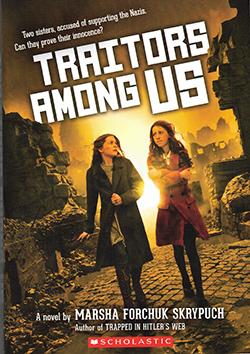Traitors Among Us by Marsha Forchuk Skrypuch, Scholastic Inc. (c) 2021; 264 pages plus author’s note, $7.99.
By Donald H. Harrison

 SAN DIEGO — This book, intended for students in late elementary and early middle schools, tells the story of two Ukrainian teenage sisters who are taken prisoners by soldiers of the Soviet Union. The soldiers and the sinister Soviet NKVD believe that however anti-Nazi the sisters might have been during the just-ended World War II, they also were opposed to the expansionist designs of the Soviet Union. From the standpoint of the commissars, although the girls were just teenagers, they were enemies of the state.
SAN DIEGO — This book, intended for students in late elementary and early middle schools, tells the story of two Ukrainian teenage sisters who are taken prisoners by soldiers of the Soviet Union. The soldiers and the sinister Soviet NKVD believe that however anti-Nazi the sisters might have been during the just-ended World War II, they also were opposed to the expansionist designs of the Soviet Union. From the standpoint of the commissars, although the girls were just teenagers, they were enemies of the state.
In truth, that was exactly how sisters Krystia and Maria how viewed the world. From their standpoint, there should be a plague on both super-powers! What they wanted to see was a free and independent Ukraine. We learn this in flashbacks to previous novels that author Skrypuch had written for students about World War II in what should be credited as a sophisticated approach to story telling. One obvious lesson the book teaches is that to be against one warring country (Germany) does not equate to being in favor of the other (Soviet Union).
In the novel, we see other nuanced situations; for example, one sister went to work temporarily for the Germans, lured by false promises of good pay. She thought the money would be useful to her oppressed family, but such money did not come. Yet, because she worked for the Germans, she was assumed to be pro-Nazi, while the reverse was true. We also learn that the girls’ mother was hanged in a public square by the Nazis. Her “crime”: sheltering a Jew, the act of a Righteous Gentile in which the two daughters, to their credit, were complicit.
Caught in the same Soviet roundup at an American camp for Displaced Persons was a girl of their acquaintance who was a former member of the Hitler Youth. She had been taught by the Nazis to believe that the Ukrainian sisters, being from a Slavic-speaking country, were racially her inferiors. After the war, however, she masqueraded as a refugee, and though the sisters knew her secret, they decided it would be best to work with her in an attempt to escape the makeshift Soviet prison where they were being held. They hated the girl for her previous actions, but nevertheless were willing to ally with her against a common enemy. Was that a good decision? As the saying goes, can a leopard change its spots?
Morality and the intricacies of geo-politics are among the themes in this fast-moving suspense novel which will have young readers racing through it to find out if, with all odds against them, the sisters can escape their captors. The novel is a good example of what some people call “edu-tainment,” teaching important lessons and at the same time entertaining restless young readers. It is scheduled to go on sale September 7th.
*
Donald H. Harrison is editor of San Diego Jewish World. He may be contacted via donald.harrison@sdjewishworld.com